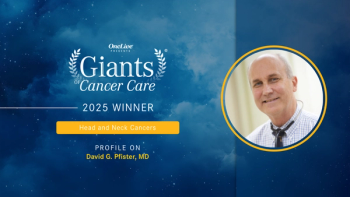
Ho Highlights the Latest Breakthroughs in Head, Neck, and Thyroid Cancers
Alan L. Ho, MD, PhD, highlights the great strides that have been made with head and neck cancer, including those with rarer diseases like thyroid cancer and salivary gland cancers, due to a greater understanding of disease biology and genomics.
Great strides have been made with targeted approaches in patients with head and neck cancer, including those with rarer diseases like thyroid cancer and salivary gland cancers, due to a greater understanding of disease biology and genomics, according to Alan L. Ho, MD, PhD. Now, research efforts are focused on exploring the potential for immunotherapy in these diseases.
Beyond the many advances that have been made with targeting BRAF mutations, agents targeting RETaberrations have also emerged in recent years. For example, in May 2020, the
Results showed that selpercatinib elicited an overall response rate (ORR) of 79% in 19 patients with RETfusion–positive thyroid cancer who were radioactive iodine (RAI) refractory and had received another previous systemic therapy. Notably, 87% of patients who responded to treatment experienced a response that lasted for 6 months or longer. In those who only received previous RAI (n = 8), selpercatinib led to an even more favorable ORR of 100%, with 75% of responders experiencing a response of 6 months or longer.
“The overall theme in thyroid cancer is seeing a better understanding of genomics and biology of the disease translate to real effective [targeted] treatments,” noted Ho.
In salivary gland cancer, investigators have discovered several disease subtypes, each with their own distinct biology and immunophenotypes. “We’re learning that the responsiveness to immune checkpoint blockade or T-cell activation is [dependent on] the difference in those biologic subtypes,” Ho explained. “It's too early to broadly recommend which tumors should receive immunotherapy, but those data are being generated now.”
Dual immunotherapy combination regimens such as ipilimumab (Yervoy) plus nivolumab (Tecentriq) are under exploration in adenoid cystic carcinoma and non-adenoid cystic carcinoma, according to Ho. Immunotherapy is also being evaluated in combination with radiation, chemotherapy, and TKIs.
In an interview with OncLive, Ho, a medical oncologist and Geoffrey Beene Junior Faculty Chair with Memorial Sloan Kettering Cancer Center, discussed advances made with targeted therapies in thyroid cancers, the potential for immunotherapy in salivary gland cancer, and other areas of active investigation.
OncLive: At the 38th Annual CFS® virtual conference, you moderated a panel on developments in head, neck, and thyroid cancers. Could you speak to this?
Ho: I'm fairly excited about the panel because it [provided] a comprehensive look at both head and neck squamous cell carcinoma, but also rarer diseases that we deal with such as thyroid cancer and salivary gland cancers. The best part of the panel is the fact that Eric J. Sherman, MD, of Memorial Sloan Kettering Cancer Center, and Barbara A. Burtness, MD, of the Yale School of Medicine, spoke about these topics; they are true leaders in the field. They discussed the new, state-of-the-art [approaches]. Also, because they're leading [several] trials and clinical research, they provided better insights into new research directions and where new, innovative therapies are headed.
What is some of the latest progress that has been made in thyroid and salivary gland cancers?
With thyroid cancer, the latest breakthroughs can be seen in the targeted therapies that are being developed and integrated into standard-of-care use. For several years now, many in the field have been successful in characterizing BRAF-mutant disease and findings ways to target that oncogene. A lot of terrific work has been, and is being, done at Memorial Sloan Kettering and Ohio State University through the International Thyroid Oncology Group. Another recent development was the amazing results seen with selpercatinib, a drug targeting RET-rearrangement thyroid cancer, as well as RET-mutant thyroid cancer.
Salivary gland cancer has also been a key academic focus of mine. The most gratifying thing is that 10 years ago [only] some trials [were being done]. Since then, [there has been an] explosion in understanding in terms of the biology and genomics of the disease. We have seen that translate into clinical trials across the country and around the world; really innovative targeted approaches [have been developed]; that's one of the things we [talked] about [during the panel. We also discussed] the current, state-of-the-art [approaches that are being used], the research directions that are based on tumor biology, and forays into immunotherapy.
Do you feel immunotherapies will play a role in salivary cancers?
Studies are ongoing. We have some immunotherapy data from a couple of clinical trials that we are conducting. Honestly, it's going to boil down to the specific type of salivary cancer that [a patient] has. As you may know, there are actually 20 different types of salivary cancers and each have their own distinct biology and immunophenotypes.
Several trials are being done. At Memorial Sloan Kettering, we have a combined immune checkpoint blockade study evaluating ipilimumab and nivolumab, both in patients with adenoid cystic carcinoma and non-adenoid cystic carcinoma. We just recently completed accrual to that trial. We [also] have an ongoing trial looking at lenvatinib (Lenvima) plus the PD-L1 inhibitor pembrolizumab (Keytruda) in those same groups. Investigators all across the country are looking at this. [We have seen] results for a nivolumab study that was done in Europe for this group of patients. There was also a pembrolizumab study that was [conducted] in a small group of patients with salivary cancer that was published in the past couple of years.
Other groups are looking at immunotherapy plus radiation, immunotherapy plus chemotherapy, immunotherapy plus axitinib (Inlyta). Many different directions are being explored, for such a rare disease. A lot of research is being done and we're going to learn a lot in the next couple of years.
Reference
FDA approves first therapy for patients with lung and thyroid cancers with a certain genetic mutation or fusion. News release. FDA. May 8, 2020. Accessed Published November 4, 2020.


































